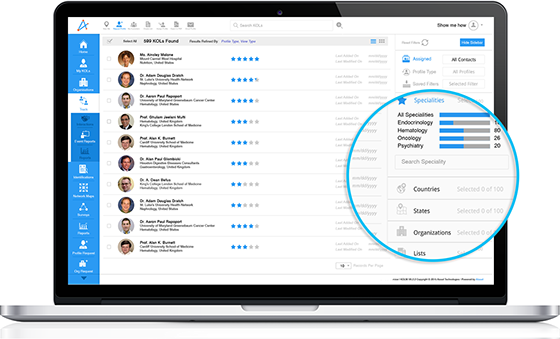25-04-2024
Effective Healthcare Marketing Strategies for Driving Pharma Sales

Healthcare marketing is a strategic process of promoting healthcare products such as pharmaceutical products (drugs, vaccines, medications, antibiotics, chronic disease medications), medical devices, diagnostics and testing kits, and medical supplies to various stakeholders such as Healthcare Professionals (HCPs), over-the-counter stores, hospitals, caregivers, and patients.
However, pharmaceutical companies major target audience for prescription drugs comprises healthcare professionals. Marketing products to these professionals can be challenging for various reasons. Some physicians operate their own clinics, while a few others work across multiple clinics or hospitals, making it difficult for life sciences companies to identify key decision makers.
In this article:
According to a study, pharmaceutical companies usually spend at least 20% of their budget on marketing, and 84% of these efforts are directed toward physicians. This is because, according to manufacturers, physicians are the key decision-makers in drug sales.
Challenges Encountered in Pharmaceutical Sales
Physicians are busy professionals and obtaining their appointment can really be painstaking for medical sales professionals. Apart from being difficult to reach, these physicians are already prescribers of some or the other pharmaceutical brands, and convincing them to switch to your product can be even more challenging. However, by executing some simple strategies, sales representatives can drive their pharmaceutical sales forward.
Segmenting Physicians Based on Their Specialties, Prescribing Behaviors, and Practice Settings
Understanding the unique needs of HCPs is key to developing a successful marketing strategy. For example, a cardiologist may prioritize information and products related to new cardiac treatments, while a dermatologist is more interested in skin care products or techniques. By gathering feedback from current HCPs and staying informed about market trends, MSLs (Medical Science Liaisons) can tailor their marketing efforts to resonate with each speciality's unique preferences and priorities.
Also, physicians may have different prescribing characteristics based on their expertise, patient demographics, and medical preferences. Some pharmacists prefer to prescribe branded medicines, while others prefer generics. By analyzing prescribing behavior data, healthcare marketers can identify patterns and trends, allowing them to better strategize their marketing efforts and target physicians who are most likely to prescribe their products.
Also, physicians practising in different settings, such as hospitals, clinics, or private practices, may have varying needs and priorities. For example, physicians working in a hospital setting may prioritize access to advanced medical technologies and treatments, while those in private practice may focus more on patient satisfaction and practice efficiency.
Strategies for HCP Engagement
Engaging HCPs requires a multifaceted approach that goes beyond traditional marketing strategies. A data-driven approach is critical to enabling personalized marketing with healthcare professionals (HCPs). By understanding HCP preferences and behaviors through data analytics, pharmaceutical companies can fine-tune their communication, making it more relevant and effective. konectar, an AI-powered HCP Management Platform, offers advanced capabilities for segmenting physicians based on their professional engagements, prescribing behaviors, location, and other relevant factors. This allows healthcare marketers to identify relevant HCPs and create marketing campaigns that drive meaningful outcomes.
Providing educational materials such as physician education videos, infographics, articles, tips, access to research articles etc., can greatly help in engaging medical professionals and make them stay loyal to the brand. Also offering patient education materials in either digital or print format that they can distribute to patients can help establish pharma brands as a trusted resource for HCPs. This builds trust and credibility, making HCPs more receptive to marketing efforts.
Using tablets, smart apps and showing recent information with good design infographics during the face-to-face meeting can also help highlight the pharms brand’s professionalism and generate physicians in the product.
Sharing real-world evidence extracted from Real-World Data (RWD) regarding the product’s usage and its potential benefits or risks of a medical product can pique interest of the healthcare professionals. Sales teams also need to highlight how a product or service benefits patients to better engage with HCPs. This approach also helps build trust and position the company as a valuable partner in patient care.
Apart from these, engaging medical professionals in various activities such as medical conferences and webinars and inviting them as speakers can go a long way in building mutual relationships.
FAQs
- Why is marketing important in healthcare?
Marketing is crucial in healthcare to raise awareness among patients and healthcare professionals. It involves educating them about medical products and services, building trust in healthcare brands, and ensuring access to innovative treatments.
- What is market access in healthcare?
Market access in healthcare involves navigating regulations and policies to ensure patients and healthcare professionals can access medical products and services.
- What are healthcare marketing trends?
Current trends include digital marketing strategies, personalized and targeted approaches, and a focus on patient-centric care to enhance communication, engagement, and access to information for patients and healthcare professionals.
- What is B2B healthcare marketing?
B2B healthcare marketing targets businesses such as hospitals, medical device manufacturers, and clinics, aiming to understand their needs and develop strategies to communicate the value of products and services effectively.
Takeaway
Healthcare marketing is vital for engaging healthcare professionals, educating them about new advancements, ensuring they become brand prescribers, and advocating quality patient care. By adapting strategies that meet the needs and preferences of target audiences, life sciences companies can drive collaboration that benefits the company, HCPs, and patients.





